| Srl | Item |
| 1 |
ID:
111958
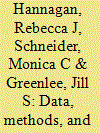

|
|
|
|
|
| Publication |
2012.
|
| Summary/Abstract |
Within the subfields of political psychology and the study of gender, the introduction of new data collection efforts, methodologies, and theoretical approaches are transforming our understandings of these two fields and the places at which they intersect. In this article we present an overview of the research that was presented at a National Science Foundation (NSF) (#SES-1014854) funded conference "New Research on Gender in Political Psychology" at Rutgers University in March 2011. This scholarship represents the expanding questions and approaches that enhance our understanding of gender within political psychology. As a result, we suggest that further innovation is needed with regard to theory and methods to understand better how gender shapes the political attitudes and actions of individuals. Our discussion here covers the use of data, interdisciplinary methods, and intersectionality to study gender. We conclude with thoughts about the theoretical implications of this recent scholarship and the future of political science research on gender.
|
|
|
|
|
|
|
|
|
|
|
|
|
|
|
|
| 2 |
ID:
126344
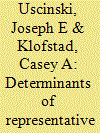

|
|
|
|
|
| Publication |
2013.
|
| Summary/Abstract |
In May 2012, political scientists learned of efforts by representative Jeff Flake (R-AZ) to eliminate political science funding from the National Science Foundation (NSF) budget. The American Political Science Association (APSA) was caught off-guard, and concerned political scientists scrambled to contact their representatives and urge the amendment's defeat. Flake's initial effort to cut funds overall from the NSF was defeated, but a second measure, specifically to keep the NSF from funding political science, passed only hours later. This was the second time in three years that legislators targeted the NSF Political Science Program. Although these measures have been sponsored and widely supported by Republicans, some Democrats have supported these measures as well. This article examines the vote on the Flake Amendment to understand why individual representatives voted for or against cutting NSF funding for political science research.
|
|
|
|
|
|
|
|
|
|
|
|
|
|
|
|
| 3 |
ID:
152589
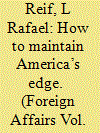

|
|
|
|
|
| Summary/Abstract |
In February 2016, scientists from the Massachusetts Institute of Technology (MIT) and the California Institute of Technology, or Caltech, joined with the National Science Foundation (NSF) to share some remarkable news: two black holes 1.3 billion light-years away had collided, and the resulting gravitational waves had been “heard” by the twin detectors of the Laser Interferometer Gravitational-Wave Observatory (LIGO). This was the first time such waves—ripples in the space-time continuum caused by the violent acceleration of massive objects—had ever been directly observed. Albert Einstein had predicted such waves a century ago, but it was long doubted that instrumentation sensitive enough to confirm their existence could ever be created. It took more than four decades of work by a vast team of scientists to make the impossible possible.
|
|
|
|
|
|
|
|
|
|
|
|
|
|
|
|
| 4 |
ID:
131535
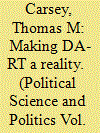

|
|
|
|
|
| Publication |
2014.
|
| Summary/Abstract |
Calls for greater data access and research transparency have emerged on many fronts within professional social science. For example, the American Political Science Association (APSA) recently adopted new guidelines for data access and research transparency. APSA has also appointed the Data Access and Research Transparency (DA-RT) ad hoc committee to continue exploring these issues. DA-RT sponsored this symposium. In addition, funding agencies like the National Institutes for Health (NIH) and the National Science Foundation (NSF) have expanded requirements for data management and data distribution. These pressures present challenges to researchers, but they also present opportunities.
|
|
|
|
|
|
|
|
|
|
|
|
|
|
|
|
| 5 |
ID:
126351
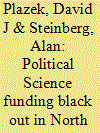

|
|
|
|
|
| Publication |
2013.
|
| Summary/Abstract |
Recent actions in Congress that threaten political science funding by the National Science Foundation (NSF) have caught the attention of political scientists, but this was not the first attack and not likely to be the last. Less than one year ago, the Harper government ended the Understanding Canada program, an important source of funding for academics in the United States and abroad. This article stresses the value of the program and the importance of this funding steam by demonstrating what the grants have done both more generally as well as for the authors individually. In addition, by looking at the political process that led to the end of the Understanding Canada program and the similarities in the attacks on NSF political science funding, this article identifies potential reasons why these funds were and are at risk. We conclude by arguing that normative action in support of political science is a necessity for all political scientists.
|
|
|
|
|
|
|
|
|
|
|
|
|
|
|
|